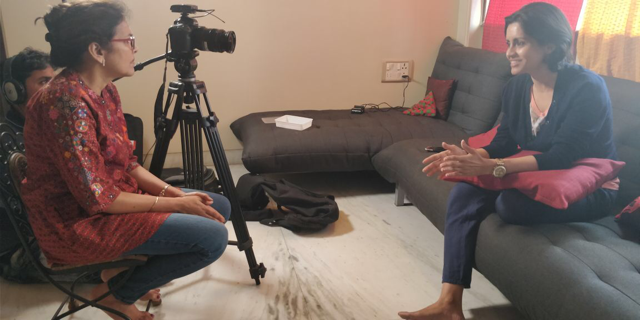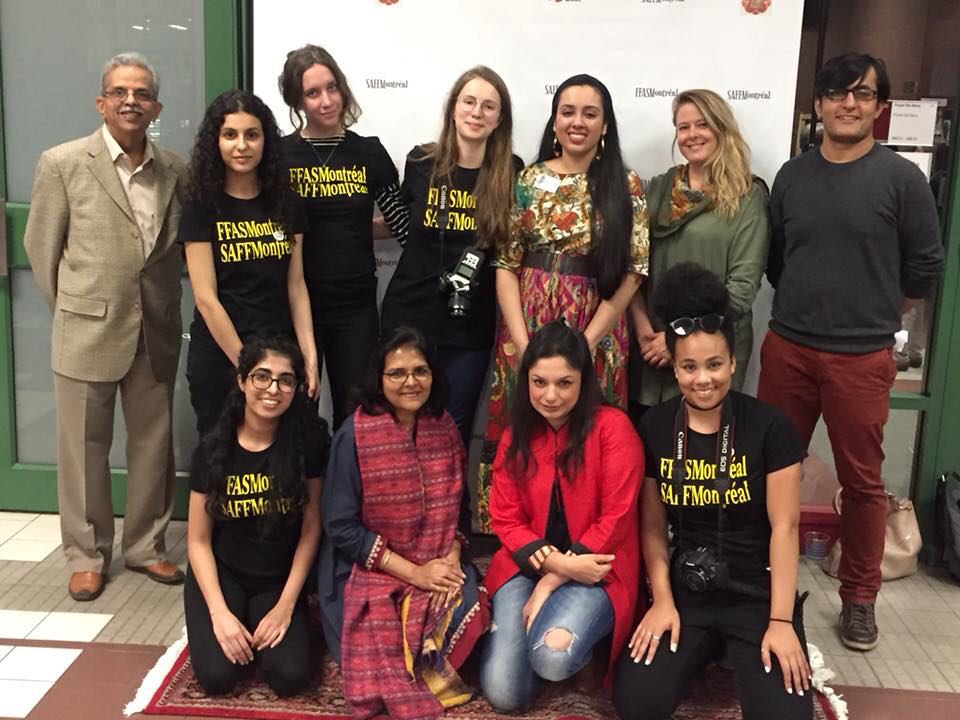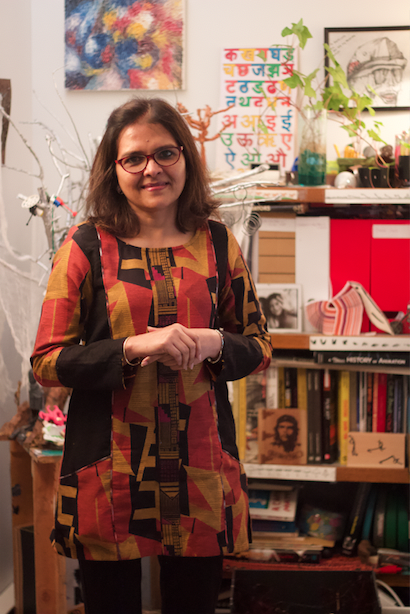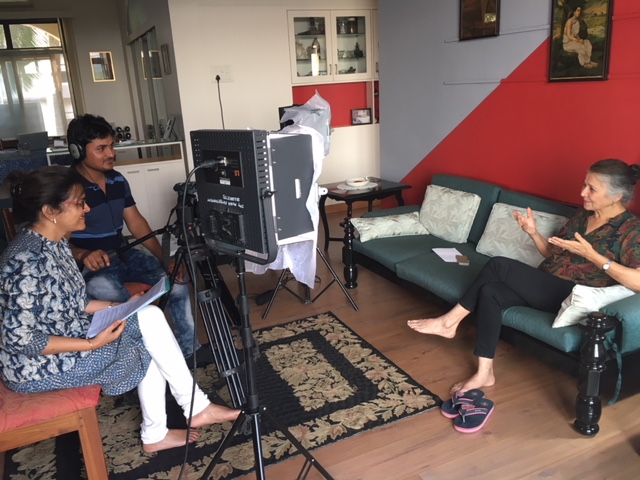Dipti Gupta has been teaching for 17 years and directed the South Asian Film Festival
“During my 20s, I used to constantly read about things that were happening in India, and it made me feel extremely angry and uncomfortable,” said Dipti Gupta, an independent documentary filmmaker, researcher and multidisciplinary artist. “I wanted to do something which would lead to justice—to a fair society for all. I thought that the pen as well as the camera were two very significant and strong tools that could bring change.”
Gupta used her writing and passion for film as tools to shape her career. In the 1980s, she regularly contributed to magazines and won many writing competitions, but she said there were no university programs in India that offered courses in filmmaking or journalism at that time. While she was studying political science and commercial art at the University of Delhi, however, she met Siddharth Sanyal.
At the time, Sanyal was producing magazines under an organization called Workbench, and he took Gupta on as a proofreader. Workbench’s office was in the same building as the production company Cinemart Foundation, which produced political and socially relevant documentaries. The company was headed by documentary filmmakers Suhasini Mulay and Tapan Bose, who became inspirations to Gupta.
One of the first documentary films Gupta saw was An Indian Story (1981), a story about the suppression of civil and democratic rights in a democratic nation. Created by Mulay and Bose, the documentary focused on a series of incidents that took place between 1979 and 1980 in Bihar, India where more than 30 people on trial were blinded with acid by the police. “It made me angry and moved me no end,” Gupta said. “At 20, it made me aware of the many injustices in our world.”

Gupta said she was very keen to work for Mulay. “I had seen her work and had admired her immensely,” she said. Despite her ambition, Mulay was reluctant to give Gupta a job. She told her: “Do you see any other women working in this organization?” When Gupta replied that there were only men, Mulay said: “Well, then you will not survive here.”
Nonetheless, Mulay ended up hiring Gupta because “she realized that, even though I looked really scrawny and small, I had a lot of guts.” Gupta got most of her training in the field while working for Mulay and Bose. “I learned a lot while working with her. She became my mentor, and today, she is a very dear friend,” Gupta said.
In addition to giving Gupta some challenging assignments—one of which required her to travel to a remote part of Delhi to interview a Hindu fundamentalist group—Mulay was also the one who introduced Gupta to her husband. He was working as a playwright in Canada, and Gupta eventually moved to Montreal in 1991 to be with him. “When you look back in life, you realize that there was some kind of a path,” Gupta said. “All the dots connect now.” Gupta’s husband runs the Montreal theatre company Teesri Duniya Theatre, which is dedicated to producing socially and politically relevant plays. Gupta has been on the company’s board since arriving in Canada.
When she first moved to Montreal, Gupta wanted to work for Studio D, a National Film Board of Canada studio dedicated to producing women’s documentaries. Unfortunately, the studio closed in 1996 due to a lack of funding. Around that time, “there wasn’t much work for new immigrants and someone who had very little or no Canadian work experience,” Gupta said.
After working for a short time with a few documentary filmmakers, including Martin Duckworth, Gupta decided to go back to school. She completed a bachelor’s degree in communication studies and got her master’s in media studies, both at Concordia University. During her studies, Gupta had a special interest in social and women’s issues. For her 1998 master’s thesis, “Confronting the challenge of distribution: Women documentary filmmakers in India,” Gupta interviewed several female filmmakers in India about the challenges they faced.
“I focused on women who had addressed issues of poverty and violence, women who were focussing on everyday struggles in society, be it education, social injustices, gender discrimination,” Gupta said. “There were so many things happening, and that’s what inspired me to do my master’s work.”

Twenty years later, these challenges are still prevalent. “I just came back from India a few days ago, and what is really sad is that not a lot has changed,” Gupta said. “People are making good films, but there is still very little funding, and today, many artists are also facing state censorship.”
After completing her master’s, Gupta began her PhD studies at McGill University in art history and communications. However, Gupta’s daughter made her realize she wanted to work in a system that would allow her the flexibility needed to take care of her child while doing research and teaching.
Gupta has now been teaching in the cinema-video-communications department at Dawson College for 17 years. She is also a part-time faculty member at Concordia where she teaches art forms of Bollywood cinema. However, she still feels sad that she never completed her dissertation at McGill, despite finishing all her course work. She said she hopes her current work may help her eventually finish it.
Gupta’s pedagogy has always focused on exploring situations or moments in history that have brought about change. “I have consciously created courses which highlight and focus on the evolution of society and the community,” she said. “I always recognize that we are ever fortunate to have an education, and we need to use this privilege to create a fair democratic society in every way.”
According to Gupta, teaching at the CEGEP level has been an extremely humbling experience. “I always remember and recognize how I was at that stage of my life as I teach these young minds. I was idealistic and had huge dreams. It is an impressionable age. Hence, we as teachers have a huge responsibility towards this age group,” Gupta said. “My focus on my teaching has always been to make sure that I can inspire students and give them tools to prepare them for their future studies and careers.”

At Concordia, Gupta’s art forms of Bollywood course focuses on the study of the construct of mythology—marriage, motherhood, masculinity and misogyny—within Indian cinema, especially films coming out of Mumbai. “My aim through that is to look at this particular construct and also to break certain stereotypes that exist while viewing and engaging with popular culture from India,” she explained.
Currently, Gupta is working on a new documentary film which explores these topics. “I think cinema gives us that window to explore and study the trends—after all, art imitates life and life often imitates art.”
These are ideas Gupta promotes outside of the classroom as well. For the last seven years, she has been on the organizing committee for the South Asian Film Festival. Hosted by the Kabir Cultural Centre, a charitable organization in Montreal, the festival highlights the work of South Asian filmmakers that focus on contemporary issues in India, Pakistan, Sri Lanka, Bangladesh, Nepal and Afghanistan. In 2017, Gupta worked as the festival’s programming director alongside her friend and fellow director Karan Singh.
One film featured in last year’s festival that particularly stood out to Gupta was A Billion Colour Story. Directed by Mumbai-based filmmaker N. Padmakumar, the film discusses communal tensions and identity issues in India. It was voted Best Film by the festival’s audience.
“The film took my breath away—with its story, it’s beautifully composed shots and the acting,” Gupta said. “[N. Padmakumar] made one of the most incredibly humane stories I have seen on screen, and it is a must-watch.”
The work Gupta does for the south asian film festival is entirely voluntary as it is a volunteer-driven festival. According to Gupta, teaching at Dawson and being a part-time employee gives her more time to contribute to other projects, such as the festival. “I am growing older, and I am realizing the urgency to contribute as well as give back to the community that has really supported me,” she said.

In terms of support, as a part-time faculty member at Concordia, Gupta said she feels that the Concordia University Part-time Faculty Association (CUPFA) is supportive and generous when it comes to providing grants for research. However, the research grants are not very large. “Often, as teachers, we end up putting in our own money to pursue the work,” she said.
According to Gupta, even if part-time professors only teach one or two courses, the number of hours that one puts in to create a course, to mentor or give feedback to each student is still the same as any full-time teacher. “The sad part is that, often, we are not even sure if we will continue to teach the class the following term—so you can be putting in all this work for just one term or maybe two,” Gupta added.
According to Gupta, the vice-president of CUPFA, Lorraine Oades, has created interesting forums/micro-talks on campus for part-time faculty. “Every time we get a CUPFA grant, we come and talk about our research work and the kind of contributions we are making in our discipline,” she explained. “This is very helpful.”
Aside from the film festival and teaching, Gupta is an independent filmmaker herself. Using funding from CUPFA, she made a short documentary film in 2014 alongside Karan Singh called At Home in the World. The short film celebrates over 100 years of Indian cinema in the multicultural city of Montreal. It explores Montrealers’ love of Indian cinema and their understanding of films from that country.
Gupta said establishing connections with people has been important to her life and her success. “One encounter can create a lifetime of great bonds—that is what I have learned through this entire journey,” she said. “You just have to have love in your heart and respect for people, and you will go a long way.”
As for women who aspire to become documentary filmmakers, Gupta had one piece of advice: “The key as a filmmaker and as an artist is to identify what inspires you, what drives you. I think, in your heart, you always know.”




